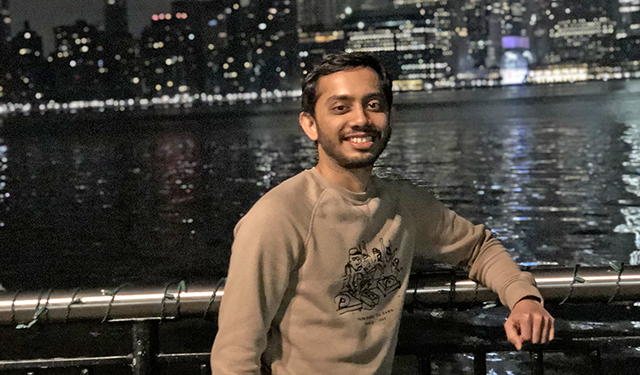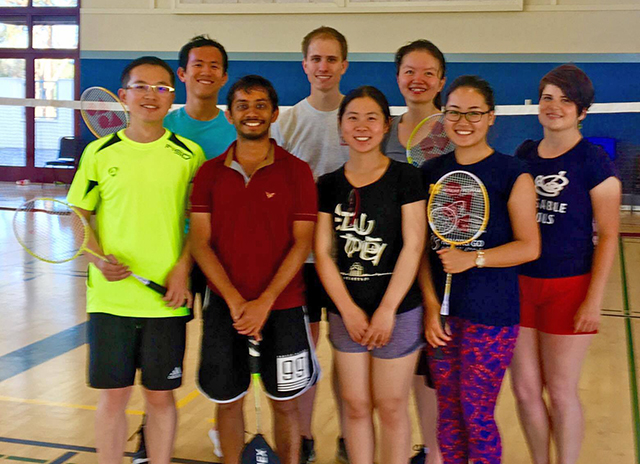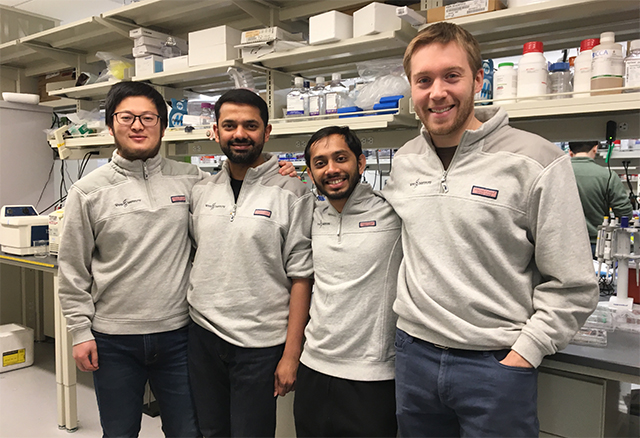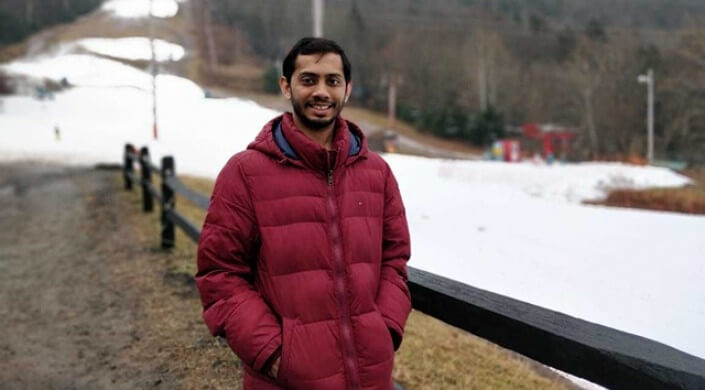Bioengineering graduate student Anvay Ukidve is researching the use of red blood cells to deliver therapeutic nanoparticles inside the body. (Photo courtesy of Anvay Ukidve)
With Mumbai’s buses packed to the gills during rush hour, Anvay Ukidve often found himself commuting to class at the Institute of Chemical Technology by ‘hitchhiking,’ a term used to describe passengers who hang precariously onto the outside of buses as they wind through the crowded city streets.
Now, as a graduate student in the lab of Samir Mitragotri, Hiller Professor of Bioengineering and Hansjorg Wyss Professor of Biologically Inspired Engineering at the John A. Paulson School of Engineering and Applied Sciences, he applies similar techniques by using red blood cells to deliver therapeutic nanoparticles inside the human body.
“Instead of people standing in the bus, people would stand outside, hanging onto the windows and that’s exactly what our nanoparticles do here,” Ukidve said. “Instead of going inside the cells, they stay on the surface. It’s kind of ironic that I used to hitchhike every day on my way to class, and now I do the same thing with red blood cells.”
Nanoparticles have been used for drug delivery since the mid-1990s, but their full therapeutic potential has yet to be achieved. One reason is that once they are injected into the body, the nanoparticles are often taken up by non-target organs, such as the liver, stymying delivery of an effective dose of the drug to the target area, Ukidve explained.
By attaching nanoparticles to the surface of red blood cells, he and his lab mates want the body’s own cells to deliver them to the target organ.
“Red blood cells naturally circulate for four months in humans. No circulating material, natural or synthetic, can match that circulation time,” said Ukidve, a bioengineering Ph.D. candidate at SEAS and the Graduate School of Arts and Sciences.

Ukidve has been passionate about improving pharmaceutical therapies since he studied pharmaceutical sciences and technology at Mumbai’s Institute of Chemical Technology. (Photo courtesy of Anvay Ukidve)
The team’s research has shown that when nanoparticles are attached to red blood cells, they interact with organs differently than if they are simply injected into the body. Now, Ukidve is trying to determine if they can leverage those differences to target nanoparticles to treat specific organs.
For instance, targeted nanoparticles could hitch a ride on red blood cells to deliver a blood-clotting agent to the brain to treat localized inflammation. But as Ukidve and his colleagues perfect those processes, they face challenges in applying their research outside the lab.
“Drug delivery comes into the pharmaceutical pipelines very late,” he said. “People are more focused on the therapeutics and the biologic that is doing the work, and very late try to figure out how to get it inside the body and get it to work.”
The pharmaceutical industry is beginning to place increased focus on drug delivery, but it will take time to alter the industry’s tried-and-true processes, he said.
Improving pharmaceutical therapies has become a passion For Ukidve, but the research field wasn’t initially on his radar.
The son of two college professors in Mumbai, his interest in helping others inspired him to enroll in medical school, but he ultimately chose a biomedical engineering path so his work could benefit patients around the world.
He was inspired to pursue research by his grandfather, who earned a Ph.D. in chemistry and, as director of a major agricultural research center in India, used his training to benefit farmers across the nation.
While his academic family encouraged his research pursuits, Ukidve’s passion for sports also helped him succeed in the lab. An avid cricket and soccer player, Ukidve’s prime sport was badminton, which he played at a professional level. He relied on the mental toughness and strategic mindset required to succeed in the fast-paced sport as he delved deeper into research.

Ukidve and his badminton teammates at the University of California, Santa Barbara. (Photo courtesy of Anvay Ukidve)
“When you are losing a badminton match, it is up to you to figure out how to make a comeback,” he said. “That kind of mentality helps me in my research. When I lose track and things aren’t going my way, that mental strength that badminton taught me helps me to stay focused and keep going.”
At Mumbai’s Institute of Chemical Technology, Ukidve focused on pharmaceutical sciences and technology. He initially conducted research on zebra fish to test new drugs for epilepsy, but it was his work in drug delivery—developing a sublingual spray to treat anti-psychotic disorders and creating a new formulation to help encode pharmaceutical capsules—that really drew him in.
“Getting trained in research is more about training yourself to ask good questions than answer good questions,” he said. “The connection to the medical world always stayed close to me. I thought that it would be really great if I could do something that actually benefits the real world.”
Inspired to make an impact, Ukidve enrolled in a chemical engineering Ph.D. program at the University of California, Santa Barbara, and joined the Mitragotri lab. When his advisor accepted a position at Harvard in 2017, Ukidve decided to follow so he could continue his groundbreaking work in drug delivery.

Ukidve and his UC Santa Barbara chemical engineering colleagues (from left) Zongmin Zhao, Vinu Krishnan, and Wyatt Shields. (Photo courtesy of Anvay Ukidve)
In the lab, fabricating and characterizing nanoparticles is meticulous work. Ukidve especially enjoys studying the biological outcomes of the delivered nanoparticles, which gives a glimpse of how this research could one day positively impact humans.
“If our therapy is able to change the quality of life for certain people, if it can make a difference when it really matters, that is something that I could be really proud of,” he said.
Looking to the future, Ukidve is torn between staying in academic research, where his true passion lies, or pursuing a career in corporate R&D, where he would be able to have a faster impact on patients.
In either case, if there is one thing Ukidve learned from hitchhiking, it is that the journey itself is often as significant as the destination.
Press Contact
Adam Zewe | 617-496-5878 | azewe@seas.harvard.edu
